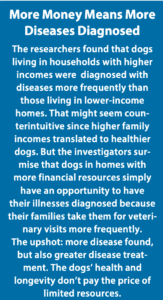Maybe money can’t buy happiness, but it can buy health. In looking over survey data collected on more than 21,000 dogs, researchers working on a nationwide initiative called the Dog Aging Project found that a higher household income was associated with better health for the dog in the home. No surprise there. More money means pets receive better medical care. What was surprising was that the company of other dogs and even companion animals of other species, such as cats, had a positive health effect that was five times greater than the effect of family income. A vibrant canine social life even had a bigger impact than house-
hold stability.
“This suggests that similar to humans, increased social enrichment in companion dogs presents health benefits and also provides an example of an easily modifiable environmental intervention to improve dog welfare,” write the investigators in Evolution, Medicine, and Public Health. Their collaboration involved more than a half dozen research institutions around the country.

The findings don’t mean you should automatically run out and get a second dog if you have just one (although dogs who live with other dogs often do have enriched emotional security and satisfaction). The scientists themselves say the results of this one study should not be used to influence policy changes related to the care of companion dogs.
Still, if you have a dog who is not afraid of other dogs and therefore does not require a very gentle and gradual reintroduction to others of her species in order to acclimate, the data do suggest that arranging play dates for your pet or perhaps just making sure to take your dog to places where she can interact with others of her own kind would be a good idea.





